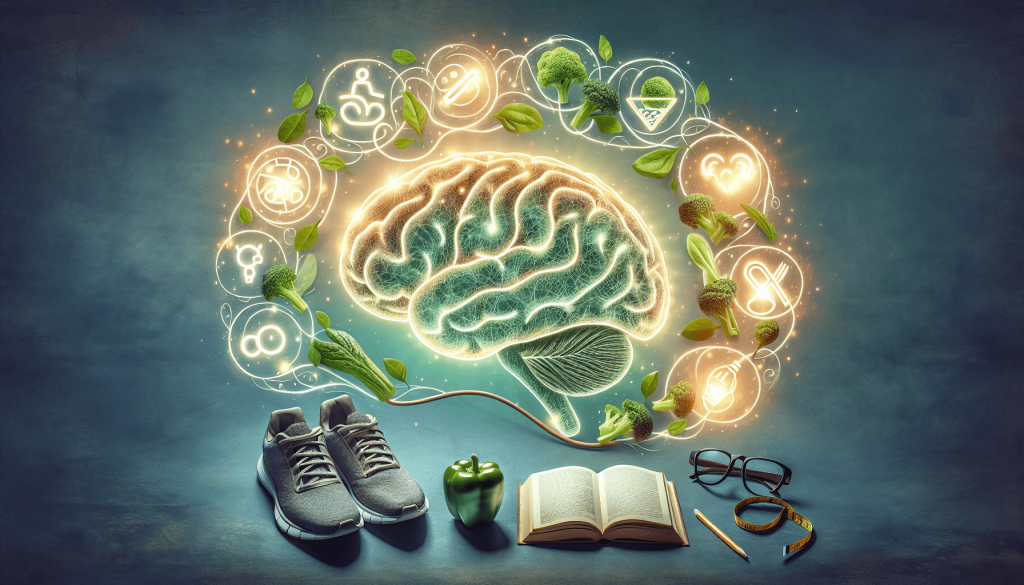How Can I Improve My Brain Health?
If you’re wondering how to enhance your brain health, you’ve come to the right place. In today’s fast-paced world, taking care of our mental well-being is crucial. Luckily, there are numerous simple and effective ways to boost your brain health and overall cognitive function. From incorporating regular exercise into your routine to nourishing your mind with a healthy diet, this article will provide you with valuable insights and practical tips on how you can improve your brain health and enjoy a sharper, more focused mind. So, let’s delve into the fascinating world of brain health and embark on a journey to unlock the full potential of your brain power.

Physical Exercise
Keeping your body physically active is not only good for your overall health but also plays a crucial role in improving your brain health. Cardiovascular exercises, such as running, swimming, and cycling, are excellent for increasing blood flow to the brain. This increased blood flow delivers essential nutrients and oxygen, promoting the growth of new brain cells and improving cognitive function.
Strength training exercises, such as weightlifting or bodyweight exercises, help to build muscle and enhance overall strength. Studies have shown that strength training can boost cognitive abilities and enhance memory. Engaging in activities like yoga and meditation can also contribute to improved brain health by reducing stress levels and improving focus and mental clarity.
Healthy Diet
Eating a balanced diet is essential for maintaining optimal brain health. Including a variety of nutrient-rich foods in your meals provides your brain with the fuel and essential building blocks it needs to function at its best. Focus on consuming a mix of fruits, vegetables, whole grains, lean proteins, and healthy fats.
Certain foods are known as brain-boosting foods and can have a positive impact on cognitive function. These include fatty fish rich in omega-3 fatty acids, such as salmon and sardines, which support brain health and reduce the risk of cognitive decline. Additionally, foods rich in antioxidants, such as blueberries, are known to protect brain cells from damage.
Staying hydrated is another crucial aspect of maintaining brain health. Dehydration can lead to fatigue, difficulty concentrating, and headaches. Make sure to drink an adequate amount of water throughout the day to keep your brain functioning optimally.
Mental Stimulation
Engaging in activities that challenge your brain is vital for its overall health and cognitive abilities. Learning new skills or hobbies, such as playing a musical instrument or taking up a new language, can help improve memory, concentration, and problem-solving skills. These activities stimulate the growth and connectivity of brain cells, enhancing overall brain function.
Solving puzzles, such as crosswords or Sudoku, and playing brain games can also have a positive impact on your brain health. These activities promote mental agility, memory retention, and improve overall cognitive function. Additionally, engaging in mentally stimulating conversations or debates with others can help keep your brain sharp and active.
Adequate Sleep
Getting enough quality sleep is essential for optimal brain function and overall well-being. Establishing a regular sleep schedule helps regulate your internal body clock, ensuring that you get enough restorative sleep each night. Aim for seven to nine hours of sleep per night.
Creating a conducive sleep environment is also important to improve the quality of your sleep. Make sure your bedroom is dark, quiet, and at a comfortable temperature. Remove any electronic devices or distractions that may disrupt your sleep.
Practicing relaxation techniques before bed can help you unwind and prepare your body for sleep. Deep breathing exercises, meditation, and gentle stretching can promote relaxation and help reduce any stress or anxiety that may interfere with your sleep.

Stress Management
Stress can have a detrimental effect on your brain health if left unchecked. It is important to practice stress-reducing techniques to protect your brain and promote overall well-being. Deep breathing exercises and mindfulness meditation can help calm your mind and reduce stress levels.
Engaging in activities that promote relaxation, such as listening to soothing music, taking a walk in nature, or practicing yoga, can also have a positive impact on your brain health. These activities help to reduce stress hormones and promote a sense of calm and tranquility.
Seeking social support is another effective way to manage stress. Share your feelings and concerns with trusted friends or family members, or consider joining a support group. Connecting with others who may be going through similar experiences can provide a sense of belonging and understanding, reducing feelings of stress and anxiety.
Social Interaction
Maintaining strong relationships with family and friends not only brings happiness and fulfillment but also has a positive impact on brain health. Regular social interaction stimulates the brain, promotes emotional well-being, and reduces the risk of cognitive decline.
Joining social clubs or groups with similar interests can be a great way to meet new people and engage in activities that you enjoy. Whether it’s a book club, a sports team, or a cooking class, participating in social activities keeps your brain active and engaged.
Volunteering in your community is another excellent way to promote brain health while making a positive impact. Not only does volunteering provide a sense of purpose and fulfillment, but it also allows you to connect with others and improve your social skills.
Brain-Healthy Supplements
In addition to a healthy diet, certain supplements can support brain health and cognitive function. Omega-3 fatty acids, commonly found in fish oil supplements or through dietary sources like fatty fish and flaxseed, have been shown to improve brain health, enhance memory, and reduce the risk of age-related cognitive decline.
Vitamin B12 is another important nutrient for brain health. It plays a key role in the production of red blood cells and the maintenance of a healthy nervous system. Vitamin B12 deficiency can lead to cognitive impairments and memory problems. Consider taking a supplement or increasing your intake of foods rich in vitamin B12, such as shellfish, meat, dairy products, and fortified cereals.
Ginkgo biloba is an herbal supplement that has been used for centuries to support brain health and improve cognitive function. It is believed to increase blood flow to the brain and protect against oxidative damage. Consult with your healthcare provider before adding any supplements to your routine.
Limit Alcohol Consumption
While moderate alcohol consumption may have some health benefits, excessive or binge drinking can have harmful effects on the brain. Heavy drinking can lead to memory problems, poor judgment, and cognitive decline. It is important to moderate your alcohol intake and be mindful of its impact on your brain health.
If you choose to drink alcohol, do so in moderation. Limit yourself to one drink per day for women and up to two drinks per day for men. It is also essential to be aware of any potential interactions between alcohol and medications you may be taking, as well as any underlying health conditions that may be exacerbated by alcohol.
Avoid Smoking and Illicit Drugs
Smoking cigarettes and using illicit drugs can have severe consequences for both your physical and mental health. Smoking has been linked to an increased risk of cognitive decline, memory problems, and dementia. Quitting smoking and avoiding exposure to secondhand smoke can significantly improve brain health.
Illicit drugs and substances, such as cocaine, heroin, or methamphetamine, can have devastating effects on the brain. These substances can lead to long-term cognitive impairments, memory loss, and mental health disorders. It is crucial to steer clear of these harmful substances to protect your brain health.
Additionally, reducing exposure to harmful toxins, such as air pollution, pesticides, and heavy metals, is important for maintaining brain health. Take steps to minimize your exposure to these toxins by using natural cleaning products, ensuring good ventilation in your home, and eating organic foods whenever possible.
Regular Health Check-ups
Visiting your healthcare provider regularly is an important part of maintaining brain health. Regular check-ups allow your healthcare provider to monitor your overall health, detect any potential issues, and provide appropriate interventions if needed.
Routine screenings, such as blood pressure checks, cholesterol tests, and blood glucose monitoring, can help identify any underlying conditions that may affect brain health. Early detection and treatment of these conditions, such as hypertension or diabetes, can help prevent or delay cognitive decline.
Addressing any health concerns promptly is crucial to maintaining optimal brain health. Whether it’s physical health issues, mental health concerns, or changes in cognitive function, seeking medical advice early can lead to better outcomes and improved quality of life.
By incorporating these brain-healthy lifestyle choices into your daily routine, you can improve your brain health and overall well-being. Remember that it’s never too late to start taking care of your brain. Every small step you take towards a healthier lifestyle can have a lasting impact on your cognitive function and quality of life. So start today and give your brain the care it deserves!
Additional Resources

This could break the brain function improvement industry in half…
You may be skyrocketing your risk of dementia…and that’s why you need to know how easily you can reverse your brain function.
This amazing breakthrough is designed to repair mental acuity and give anyone who uses it the best mental alertness with improved memory and focus in no time
Find out for yourself now…
Fortunately, your brain cells can regenerate if you use this unprecedented method…







